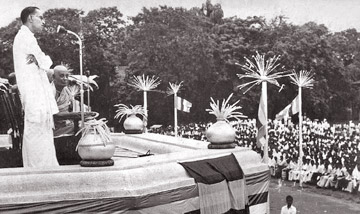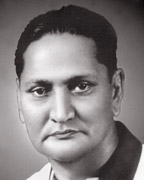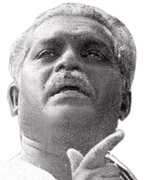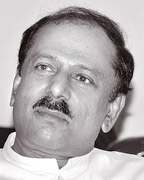|
Commemorative rally on February 21:
MEP to mark 1956 historic victory
By L.S. Ananda WEDAARACHCHI
|

1957 Independence Day address by S.W.R.D. Bandaranaike
|
The historic victory achieved at the 1956 general elections by
political and national forces which rapidly developed since 1951 was the
initial victory of Sri Lanka's historic national revolution, Mahajana
Eksath Peramuna (MEP) Leader, Water Supply and Drainage Minister, Chief
Government Whip Dinesh Gunawardena said.
A commemorative rally to mark the completion of 56 years of the 1956
national revolution led by the MEP under the leadership of S.W.R.D.
Bandaranaike, D.A. Rajapaksa and Philip Gunawardena will be held on
February 21 at 3.p.m. at the Viharamahadevi Park, Colombo.
'The Sunday Observer interviewed Dinesh Gunawardena on the 1956
national victory. Excerpts of the interview;
Q: How do you asses the 1956 election victory led by the Mahajana
Eksath Peramuna?
A:The 1956 election victory is not merely an election victory.
It was a historic national revolution. What we gained in 1948 was a
mere political freedom.
Our political leaders were agents of the British rulers. Even their
external appearance with Top-hat and trait coat suits reminded us Brown
Sahibs.
The political and national forces which rapidly developed since 1951
successfully organised the masses against the neo-colonial leaders and
takeover the country's administration successfully through the ballot.
|

D.A. Rajapaksa |
It was a silent national revolution.
The '56 victory was the outcome of the unity of the contemporary
national religious, and cultural forces of the country popularly known
as "Sanga-Weda-Guru Govi-Kamkaru Pancha Maha Balavegaya.
Q: Is this victory important in today's context?
A: The British colonial rulers did not want to give total freedom to
Sri Lanka. They kept Katunayaka and Trincomalee air and naval bases
under their authority. A mentally enslaved class which always ignored
and hated local traditional values languages and religions were created
by the British rulers.
They wanted to keep that class led by D.S. Senanayaka Sir John
Kotalawala and J.R. Jayawardena in power.
The colonialist mentality was realised by the progressive political
leaders such as S.W.R.D. Bandaranaike D.A. Rajapaksa, Philip Gunawardena
Dr. N.M. Perera and Dr. S.A. Wickramasingha, Trade unions and national
movement leaders.
 |
 |
| Philip
Gunawardena |
Minister
Dinesh Gunawardena |
They all got together to defeat the colonial rulers' conspiracy to
keep the country under their thumb through their local agents.
Q: Do you see any capitalist threat to Sri Lanka today?
A: Yes, who were behind the LTTE terrorism which destroyed our
motherland for more than three decades. Under the able leadership of
President Mahinda Rajapaksa, Sri Lanka eradicated the LTTE terrorists
and gained independence from the terrorism .
All anti-Sri Lankan forces are trying to cripple the progress of Sri
Lanka to gain political and economical independence.
The dream of the leaders of 1956 was socialism to dawn a new era
where Sri Lankans have political, social and economical freedom. After
creating a peaceful environment in Sri Lanka. President Mahinda
Rajapaksa led government aims ushering in prosperity through development
project.
The anti-progressive local and foreign forces want to sabotage
progress. Various attempts under the guise of human rights and freedom
movements are being staged by capitalists who are pumping dollars for
those who create problems for the government.
In 1956 too several attempts were made by local and foreign forces
against S.W.R.D. Bandaranaike Philip Gunawardena alliance.
Finally, they succeeded in getting rid of Philip Gunawardena from the
Cabinet and later assassinated Prime Minister S.W.R.D. Bandaranaike in
1958.
Q: There was an attempt to turn round the 1956 forward march
specially with the economic and political spheres in Sri Lanka in 1977
under the J.R. Jayawardene regime. What is its impact?
A: The consequences of wrong economic and political policies
introduced by the J.R. Jayawardene regime are visible today.
The entire Country and the people became victims of his capitalist
-rightist policies.
It is an accepted fact that most of the nasty practices, corruptions
wastages, lawlessness introduced to this country by 1977 regime. The
distraction of nationalisation of pubic transport and setting up of the
Ceylon Transport Board (CTB) in 1957 were ideal examples.
The CTB was gradually destroyed and private bus operation was
encouraged by the UNP regime.
The same thing was done to the CWE which handled the distribution and
sale of essential food items.
All these were done for the benefit of the rich and not for the poor
people. During that period the whole Sri Lankan society became a
cultural desert with scant attention paid to languages, religion and
cultural values. J.R. Jayawardene's short sighted policies led to the
creation of the LTTE.
The aspirations of 1956 revolution are meaningful even today. It is
essential that we become totally independent from economic, social and
political interferences. |

